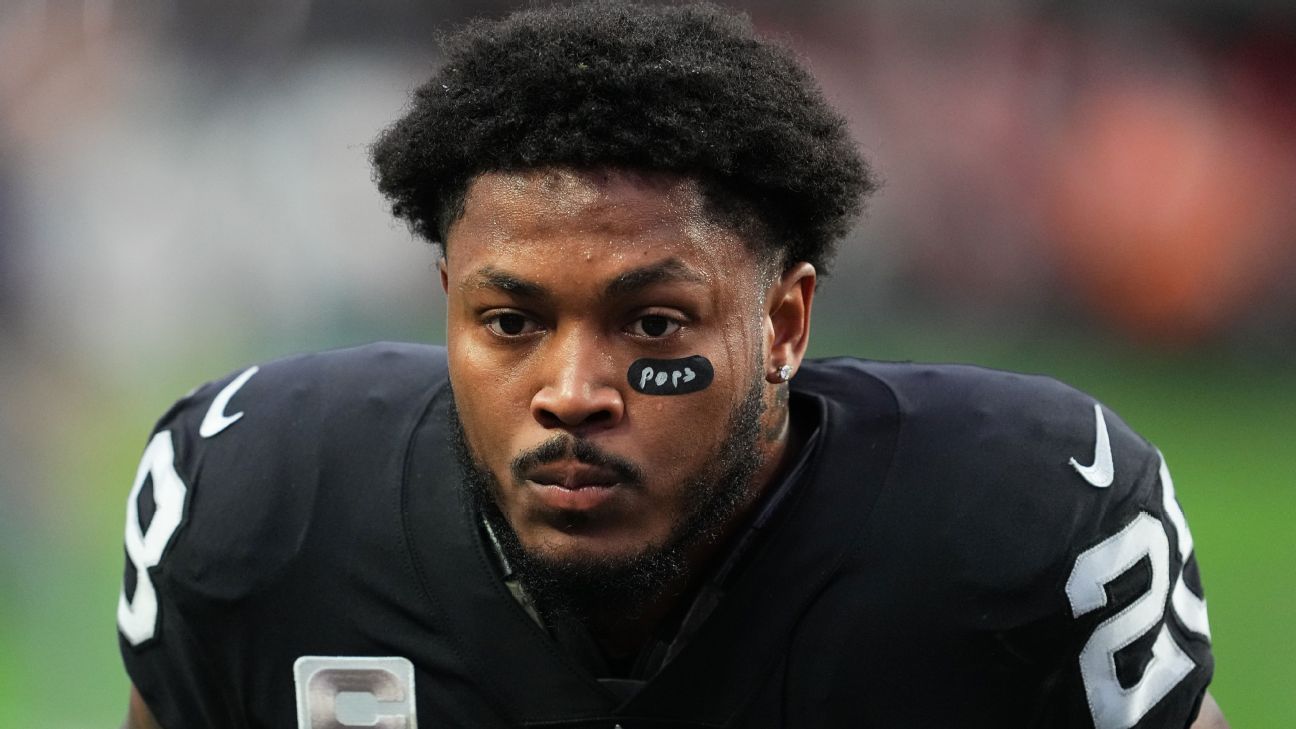Fantasy football managers and Las Vegas Raiders fans loved what RB Josh Jacobs achieved last season. Jacobs had been a solid statistical performer during his first three NFL seasons, twice ending up an RB2 and once slipping into the top 10 among season scorers at his position, but he was never a superstar. Certainly not like he was in 2022.
Last season, Jacobs played at a superstar level. Sans a long-term contract and in what could have been his final season with the organization, the Raiders gifted him with ridiculous volume and Jacobs thrived. No player had more touches, rushing yards or yards from scrimmage. Only two running backs –Austin Ekeler and Christian McCaffrey — and nine players scored more PPR points.
This is a trap, fantasy managers. Jacobs entered last season an RB2 option, playing for a new deal he did not get. Perhaps you have heard, but he’s not the only angry, bitter running back in the league. Teams are financially cautious with the position. Jacobs isn’t pleased. He’s not at training camp and is a risk to sit out regular-season games.
However, even if Jacobs were signed long term and happy, he was unlikely to replicate his fantastic season with another 300-plus PPR points. Sure, we love the big volume while it is happening, but we have myriad cases of running backs failing to approach their numbers — volume or efficiency — the following season as proof of it, and it makes Jacobs a prime player to avoid at his current top-20 position in ESPN average live drafts.
Entering 2022, a mere eight running backs received 310 or more rushing attempts in a season (big volume, for this era) over the past decade, and here are their results the next season.
-
LeSean McCoy topped 310 rushing attempts in consecutive seasons (2013, 2014) and never did so again. The Eagles traded him to the Bills in 2015, and he missed four games. He enjoyed one more RB1 season.
-
DeMarco Murray ran wild for the 2014 Cowboys, handling 392 rushing attempts. He was an Eagle the next season (replacing McCoy), and he could not stay healthy (8 starts, 193 rushing attempts). His final season was 2017.
-
Adrian Peterson, then 30, rushed 327 times for the 2015 Vikings. A series of injuries kept him to 13 games over the next two seasons, as he jumped from team to team. He never approached 300 touches again.
-
Ezekiel Elliott enjoyed his best season as a rookie in 2016, and he missed six games the following season. He rebounded to sneak past 300 rushing attempts in 2018 and 2019, but never had an efficient season like 2016 again. At 28, he is currently looking for work.
-
Le’Veon Bell topped 300 rushing attempts one time, in 2017, and then he held out for a bigger contract and sat out the next season. He played three more seasons for four teams, never again a fantasy factor.
-
Dalvin Cook slid past 310 rushing attempts over 14 games in 2020, and the next season, in one fewer game, he had 63 fewer attempts and more than 100 fewer PPR points. As with Elliott, as of this writing, he is not with an NFL team.
-
Derrick Henry used his 378 rushes to sail past 2,000 rushing yards in 2020, and then he missed half of the 2021 season because of injury. He bounced back nicely last season, but unlike others on this list, plays little role in the passing game, and is quite a bit larger than the others.
-
Jonathan Taylor was fantasy’s best player in 2021. Let’s just say he was not fantasy’s best player in 2022.
There is a clear theme here of a big-volume season portending injury and also of NFL teams looking to move on from players before that happens. Fantasy managers should notice the trends. Among the above group of players, the average rushing season following the year after the big volume — for those who played — fell short of 1,000 yards. Most missed games. Jacobs was awesome and won fantasy leagues, but we must look forward, not back.
Also, perhaps we should be writing a positive article about Derrick Henry, for he is the rare exception of a player who can handle large volume year after year, topping 300 rushing attempts in three of four seasons. He remains effective, likely in part to his build. The other running backs have not held up as well. They get hurt. They see their volume fall. They are not as effective.
Give Jacobs full credit for last season, when he played through myriad injuries, but things are different now. The Raiders remain uncommitted to him long term but are far more likely to share his usage, assuming he even suits up in Week 1. There is real risk here. Jacobs also seems far more likely to sit games to nurse injury, too. It hardly means Jacobs will be a notable bust, as he was a solid RB2 choice his first few seasons, but those choosing him over a top-end wide receiver might regret the move.
Here are other players fantasy managers should be wary of selecting at their current ADP spot. After all, who wouldn’t take Jacobs in Round 4 or 5? It’s all about value.
